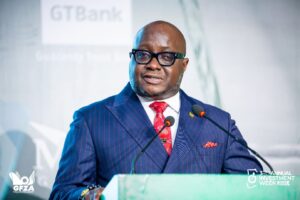- New policies in the offing
- Funding secured through DBG
- GFZA to support business benefit from AfCFTA
- Improved supply of electricity, energy
With new and updated policies ready to be introduced, funding secured through the Development Bank Ghana (DBG), increasing supply of electricity and improved transportation networks, the manufacturing industry is on the verge of transformation, according to Alan Kyerematen, Minister of Trade and Industry.
Speaking at the third annual Ghana Free Zones Authority (GFZA) Investment Week, Mr. Kyerematen sounded very hopeful about the fortunes of the sector and the potential it has to not only create jobs, but transform the economy while stabilising the local currency and reducing the nation’s overreliance on imports.
“There is a need to promote exports as a nation now more than ever. As a country and a growing economy, we must be able to produce our basic needs as well as have the abundance to promote exports for foreign exchange. This is the key objective of government’s initiatives, such as the One District One Factory (1D1F),” he said.
New and updated policies
Touching on the individual policies and moves by other agencies, departments and ministries, Mr. Kyerematen pointed at the Special Economic Zones Policy which is an upgrade of the free zone programme to ensure that Ghana stays abreast with the trends. “Development of other industrial parks and special economic zones will be designed to have the full supply chains and interrelated industries to create synergy within the zones.”
He added that his ministry is implementing other sector specific programmes, such as the Automotive Assembly Programme which has seen government approve a new Components Manufacturing Policy that seeks to support the local production and supply of components and spare parts for the automotive industry.
“Through this policy, it is expected that the automotive industry will have access to ready and locally manufactured spare parts which will also create more employment opportunities. These programmes present investment opportunities for companies interested in this sector. The policy will be launched, and implementation will commence in 2023.”
Funding
On funding, Mr. Kyerematen said government has made considerable provision through the Development Bank Ghana (DBG). This has resulted in the establishment of a GH¢500million special credit programme called the DBG Emergency Economic Programme (DEEP) to support businesses in the agribusiness value chain over the next five years. The priority sectors are poultry, rice & cereals, pharmaceutical manufacturing, tourism, textiles & garments to help build economic resilience.
Electricity/energy
“Access to electricity is key to industrialisation. In this regard, I am happy to report that connectivity to the national grid has seen an immense increase, with a total of 157 communities linked to the national grid as of September 2022. The Ministry of Energy will further connect an additional 400 towns under the SHEP-4, SHEP-5 and Turnkey Projects in 2023. This will also go a long way to support businesses, such as the single factory free zones enterprises located all over the country, to have access to reliable energy to produce more for export,” he said.
Transport
Connectivity through transport infrastructure is critical to development, productivity and increased export. The government, he noted, is committed to infrastructural projects – the construction of the Kumasi Lake Roads and Drainage Extension project, the rehabilitation of Assin Fosu-Assin Praso roads, the dualisation on the Tema-Aflao, and the Tema-Akosombo roads, and many others – that will help connect various companies including free zones enterprises.

GFZA Investment Week
Ambassador Micheal Oquaye Jnr., Chief Executive Officer of GFZA, noted that the Investment Week celebration, which was under the theme ‘GFZA: Championing Export-Led Industrial Growth in the context of AfCFTA and World Trade’, is an annual event to showcase the achievements of the Free Zones Programme.
“The essence of this forum is to come together to take stock and discuss issues of common interest to improve the operations of the Free Zones Authority and Enterprises as well as address any challenges you and we may be facing because of the pandemic and current worldwide economic situation. It is also to update you on new trends and policies that will have an impact on your operations”.
Currently, there are 217 active free zone enterprises. Cumulatively, the free zone enterprises have made export earnings of over US$27billion, employing about 33,000 people directly with over 31,000 being Ghanaians. “These are impressive achievements, and I would like to take this opportunity to appreciate your contribution toward the development of the Ghanaian economy.”
Amb. Oquaye Jnr. charged that with traditional supply chains from Europe, America, China, India, Turkey unable to sustain the needs of Africa, “we need to drive our own business cars and fly our own business jets all over Africa, and therefore, the AfCFTA is our only solution of self-reliance in Africa. The time to walk the talk is now and the GFZA is ready to take this charge in tandem with AfCFTA Secretariat and MOTI”.










